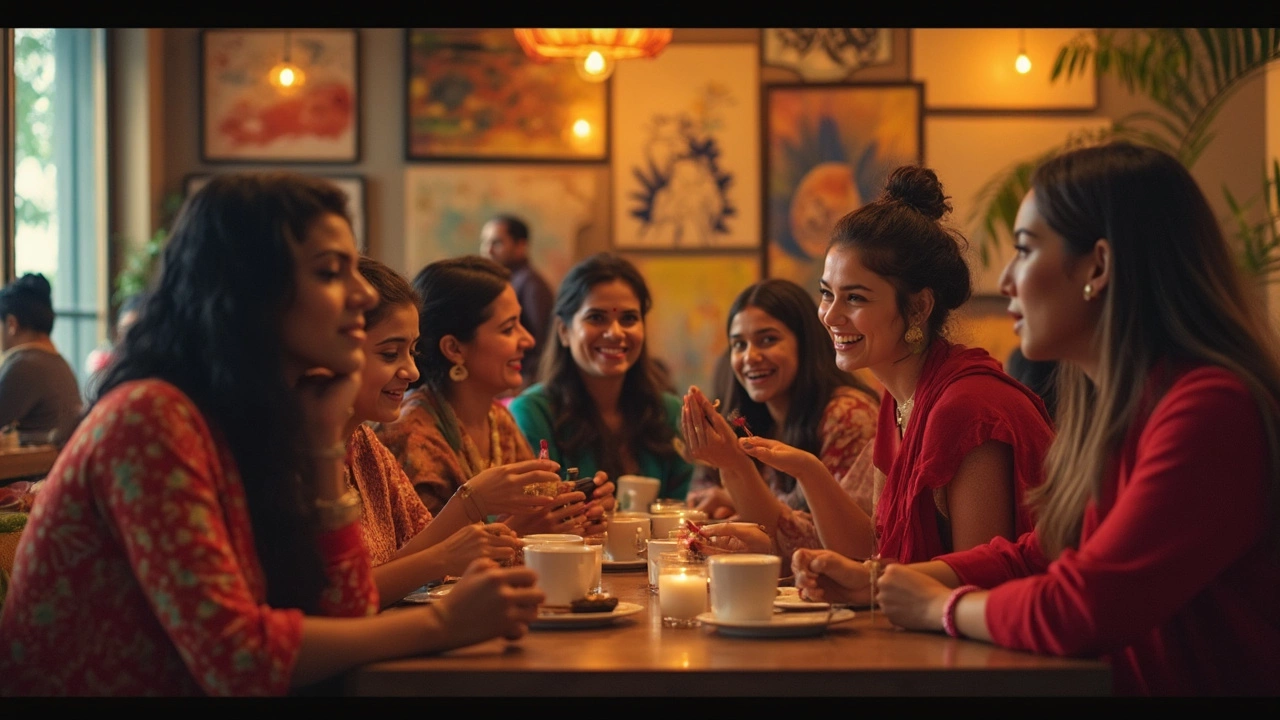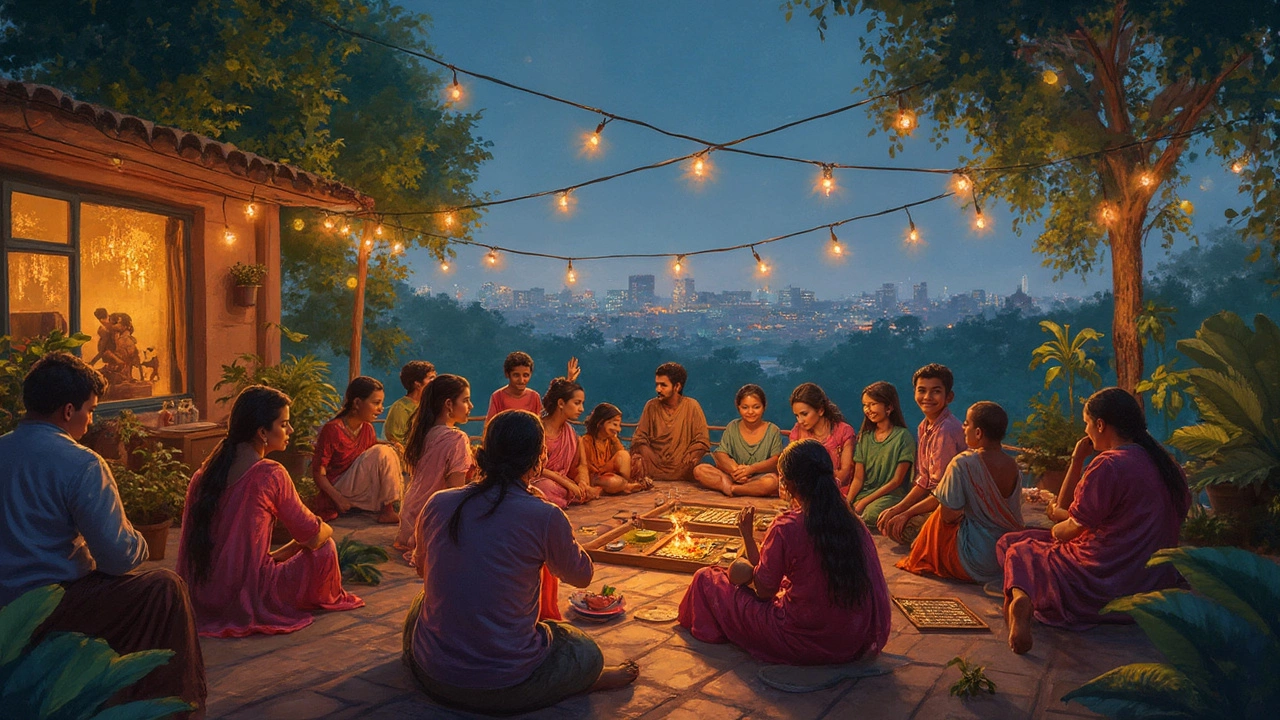Why Do People Go to Social Clubs? The Real Reasons Behind the Splurge
 Jun, 5 2025
Jun, 5 2025
People fork over good money, and invest a lot of time, just to be part of a club. Seems a bit much? Not if you peek into what keeps them coming back. Social clubs aren’t just rows of plush chairs—they’re more like a backstage pass to new circles, fresh ideas, and sometimes, life-changing moments.
Sure, you could meet people anywhere. But at a club, it’s different. Everyone’s there because they want to connect—no awkward small talk in line at the store. Whether you’re swapping stories over a card game, planning a charity run, or learning to cook something wild, social clubs bundle up all kinds of experiences you simply can’t get from a group chat on your phone.
- What Makes Social Clubs So Appealing?
- Perks Beyond Parties
- The Secret Power of Community
- Tips for Picking the Right Club
What Makes Social Clubs So Appealing?
It’s wild how much people crave real connection in a world practically glued to phones. That’s where social clubs come in—they build in-person bonds that apps just can’t touch. According to a 2023 Pew Research study, 61% of people said they felt lonelier than ever before, but those joining clubs report a solid boost in happiness and community belonging.
One big draw is how clubs bring together folks with the same interests. Want to play chess or get better at painting? Clubs tend to be laser-focused, so you instantly land among people who get your vibe. No random small talk—just meaningful activities.
Walking into a club feels way less forced than some big networking event. Most have regular meetups, making it easy to slip in and gradually get to know people. And it doesn’t hurt that many clubs offer actual perks, like discounted tickets, exclusive events, or partner deals. For example, some fitness social clubs give members free access to gyms they partner with.
Check out how these benefits stack up among real club members:
| Club Type | Main Benefit | Member Satisfaction (%) |
|---|---|---|
| Book Club | Shared learning, friendship | 82 |
| Sports Club | Health, social events | 76 |
| Networking Club | Career connections | 68 |
| Hobbyist Club | Skill building, fun | 74 |
If you ever feel stuck or in a rut, clubs are an easy nudge out of the comfort zone. Meeting people outside your usual crowd can spark new ideas and open doors you didn’t expect. Some folks even find their next job or business partner through a club meet.
- You can dip a toe or dive in deep—it’s up to you.
- No pressure to perform, just show up and join the vibe.
- Most clubs are way more affordable than you might think—especially community ones.
Perks Beyond Parties
Social clubs are definitely known for their parties and get-togethers, but the real value comes way before the first drink is poured. For a start, if you're into learning new things or upskilling, these spots are a goldmine. Clubs often host hands-on workshops, expert talks, or exclusive tastings. You can pick up cooking tips from a well-known chef, hear from an industry pro about how to ace your job, or even dabble in some art with people who genuinely want to have fun doing it.
A survey by The Club Leaders Forum in 2023 found that nearly 58% of club members joined for perks that go beyond social events. Things like professional networking, wellness programs, and family activities scored high. And yes, some even joined for top-notch pickleball courts or private yoga classes. Social clubs are making it easy to mix productive downtime with a little bit of pampering.
| Perk | % of Members Valuing It (2023) |
|---|---|
| Networking Events | 44% |
| Sports & Fitness Facilities | 37% |
| Educational Workshops | 32% |
| Family Activities | 25% |
A lot of clubs now focus on wellness—think stress-relief workshops, group fitness, or mindfulness meetups. The best part? You don’t have to be an expert. You just show up and join in, no weird pressure to perform.
Real talk from people inside these clubs says it best. As Karen McHale, a long-time private club member in Austin, told Club Management magazine,
"I joined for the social scene but stayed for the friendships, business tips, and just the sense that I can really try new things—without feeling judged."
The key is, these perks go far beyond clinking glasses at happy hour. They help people build real skills, support new interests, and even boost your career if you play your cards right. Don’t just consider clubs as party spots—they’re actually practical and can pay off in ways you might not expect.

The Secret Power of Community
There’s a reason why people say, “You are the company you keep.” When you’re part of a social club, you’re not just hanging out—you’re plugging into a built-in network that looks out for each other. Studies show that active club members are generally happier and live longer, mostly because strong social ties support mental health and keep isolation at bay.
It isn’t about fitting into some exclusive crowd. Most clubs run on the idea that helping others helps everyone. You’ll spot folks brainstorming business ideas, volunteering together, even swapping babysitting or job tips. Just one good connection at a club can boost your confidence and open up doors you never saw coming.
Groups like Rotary or Lions handle huge projects—cleaning up local parks, running food banks—because teamwork makes it doable. But it’s not just global groups; even your neighborhood book club can make a dent, whether it’s supporting a local bookstore or pitching in for a community event.
- Need backup during tough times? Club members are often the first to show up with a casserole or a ride to the airport.
- Trying to break into a new career? Someone in your club probably knows a person who can help.
- Want to build new skills? Clubs offer low-pressure spots to practice leadership, public speaking, or just being more social.
Most of all, being part of a social club offers a sense of purpose. People need to feel like they belong somewhere. Clubs make that happen—they connect you to something bigger, but also give you a place where everybody knows your name, quirks and all.
Tips for Picking the Right Club
Not every social club is going to be a good fit, and that’s just plain reality. The trick is to know what you actually want out of it before you dive in. People join clubs for different reasons—some to network for career moves, some to explore shared hobbies, and others just to find a place where they feel they belong. If you rush your decision, you could end up bored or out of place, so do a bit of homework first.
Here’s how you can make sure you’re picking a social club that actually delivers:
- List out what you want. Are you after business contacts? Looking for a tennis partner? Or do you just want to meet new friends? Clarity pays off fast.
- Check the club’s vibe online. Real clubs usually have active websites or social media pages. If you see photos and comments you relate to, that’s a good sign.
- Don’t ignore the cost. Some clubs ask for annual fees that can run over $1,000 a year. Others might be free or donation-based. Make sure what you pay matches what you get.
- Visit before you join. Tons of clubs let you attend a session for free or at a discount. It helps you see the crowd, the energy, and how organized things are.
- Ask about commitment. Some clubs meet just once a month, others get together weekly. Be honest with yourself about your free time so you don’t overcommit.
Here’s a quick look at common types of social clubs and what they focus on:
| Club Type | Main Activities | Average Annual Fee (USD) |
|---|---|---|
| Networking Club | Business connections, professional talks | 1,200 |
| Hobby Club | Sports, arts, gaming, cooking | 250 |
| Community Service | Volunteer work, fundraising | 50 |
| Exclusive/Luxury Club | Fine dining, private events | 2,500+ |
The most important thing? Try to chat with current members. Are they helpful, or do they seem closed off? Nothing gives you a better sense of a social club than the people who already call it home.